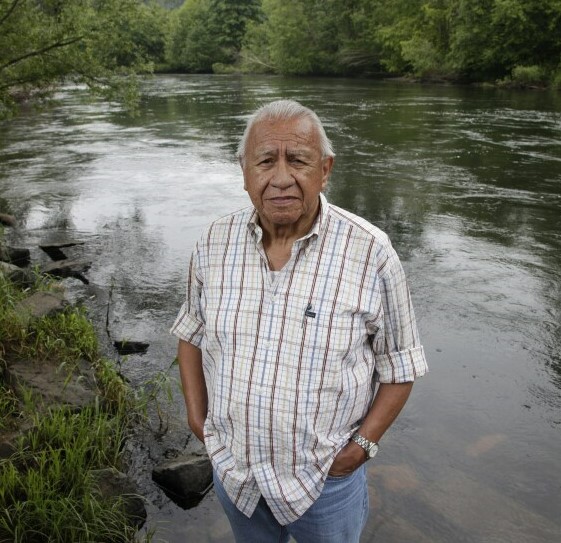Guest Author: Amy Hepburn

I recently began attending Native Connections Action Group meetings and am very impressed with how much everyone is doing to achieve their goals. When Jo Blair said she’d welcome someone writing in honor of Billy Frank, Jr. for the Friday weekly Update, I took the plunge. I was apprehensive about my ability to provide a tribute, to say the least. I knew very little beyond the basics, just that he was a central figure in the Boldt Decision that increased Washington State tribes’ access to fishing grounds.
In celebration of Billy Frank, Jr. Day in WA State, March 9th, I’ve been on a wonderful journey, getting to know him. I had very little understanding of the contributions he made for Native American treaty rights and sovereignty, to salmon fisheries and the complex habitat needed for them to avoid extinction and thrive, and to the relationships between Native Americans and whites in Washington and beyond. He is in the same category of civil rights leader as Martin Luther King, Jr. He had extraordinary skills at resolving conflicts in high stakes situations by always being trustworthy, and consistently focusing on the big picture and the future. He’s been described as “a hail fellow well met that everybody loves. He also can be one tough son of a bitch when salmon are involved and Indian rights are involved. And that’s part of his greatness.”
Billy Frank, Jr., son of Willy Frank, Sr. and Angeline Tobin, and a member of the Nisqually Tribe, was born in 1931. His family and tribe had fished for salmon and steelhead on the Nisqually River for centuries, and Billy Frank, Jr. grew up as a fisherman, too. His family and tribe have struggled with the white settlers and their descendants since the colonizers arrived in the mid-1800s. Billy took up the struggle as well, and in 1945, at the age of 14, was arrested for the first time for fishing off-reservation. Over the course of the next 30 years, he and other activists would be arrested dozens of times, often while being subjected to racially charged law enforcement treatment. It was a very tough time, yet Billy Frank Jr., and the other activists continued to fish where the State of Washington prohibited them, thus ensuring ongoing trials in the courts, and press attention.
So what are the issues? It was primarily the interpretation of the Medicine Creek Treaty of 1854, which exchanged 2.24 million acres of land at the head of Puget Sound with three reservations (for Native Americans), cash payments, and recognition of traditional native fishing and hunting grounds. The State of Washington said that Indians could not fish off-reservation, and Billy Frank, Jr. and his fellow activists, believed that the treaty gave them the right to fish from their traditional grounds, most of which were not included on reservations. Compounding the conflicts around the treaty were the extreme pressures on the salmon fishery, so that by 1970, the tribes were able to take only 5% of the total salmon catch. These same environmental and political conflicts and pressures continue today, and most salmon fisheries are now endangered. The human rights, and sovereignty rights of Native Americans are more visible to Whites now, in no small part due to Billy Frank, Jr.
The struggle for the right to fish in non-reservation fishing grounds per the Medicine Creek Treaty, became a federal lawsuit, brought by the U.S. Attorney against the State of Washington. It was heard before the Federal Ninth Circuit and Judge George Boldt in 1974. Judge Boldt decided in favor of the Native Americans’ right to fish for up to 50% of the catch in their traditional waters, which were mostly not part of the small reservation lands. The Boldt Decision overturned the ground rules that had structured the development of commercial salmon fishery in WA. It also strengthened Native sovereignty rights in WA. The backlash was intense and lasted for years, with boats damaged, physical confrontations, and politicians refusing to follow the ruling. The State of WA attempted to appeal the ruling and was sharply criticized by the court. Allegations of intention to seriously injure or kill Indians were brought against the WA Game and Fisheries patrols at this time.
The Boldt Decision also abolished regulations that discriminated against Indian fishermen and directed that the State of WA’s role is in preserving fish runs, not regulating the tribes’ share. Indians were allowed to self-regulate and co-manage the resource. The Northwest Indian Fish Commission (NWIFC) was created, and included “all the tribes, Lummi to the ocean, and South and North Sound to the Pacific.” Billy Frank, Jr. was involved in the creation of the NWIFC, and had several terms as chairman. He participated in decades of negotiations with the timber industry, tribes, farmers, environmentalists, and government agencies in WA, in various roles. He also participated in many negotiations and meetings concerning Native sovereignty around the country. By the early 2000s, Billy Frank, Jr. was educating Washingtonians about the habitat degradation caused by mismanagement and political stalling.
Billy Frank, Jr. died in 2014 at the age of 83. He was awarded the Presidential Medal of Freedom by President Obama. And his legacy, and that of his family, has been taken up by his son, Willie Frank, III, who since May 2021, has been the Chairman of the Nisqually Tribe. As part of a larger strategy to protect the Nisqually River, and the salmon in it, the Nisqually Tribe and the Nisqually Land Trust purchased 2,200 acres of land along the Busy Wild Creek in September of 2021. This area feeds a main tributary of the Nisqually River and was once part of the land they lived upon.
I am grateful for the opportunity I’ve had to learn about Billy Frank, Jr., and I now deeply respect him and the hard work he did. I also enjoy his direct way of expressing important truths. “I don’t believe in magic, I believe in the sun and the stars, the water, the tides, the floods, the owls, the hawks flying, the river running, the wind talking. They’re measurements. They tell us how healthy things are. How healthy we are. Because we and they are the same. That’s what I believe in. Those who learn to listen to the world that sustains them can hear the message brought forth by the salmon.”
Resources to learn more about Billy Frank, Jr., and salmon recovery efforts:
A 5 minute video: Click Here
Where the Salmon Run: The Life and Legend of Billy Frank, Jr. by Trova Heffernan.
Tell the Truth, The Collected Columns of Billy Frank, Jr., available on Amazon Proceeds from the sale go to the Billy Frank Jr. Salmon Forever Fund, managed by Salmon Defense.
Salmon Defense: Click Here
Northwest Indian Fisheries Commission: Click Here

Thank you for adding to our knowledge of the strong leaders and great people who have fought for rights in our local area.
Dear Amy—
Nice job! Thank you for writing this incredibly well researched blog on one of Washington’s most inspiring and well-loved indigenous leaders. The extra video and website links were a welcome addition.
Amy: Thank you for all the information about Billy Frank, Jr. and all he did in his lifetime. I have heard of him but never took the time to learn about his life. He certainly made huge contributions in terms of Native American fishing rights and the impact of habitat degradation. A life well lived.
Friends, this last section of my blog was inadvertently omitted. Hopefully, it makes a bit more sense. “I am grateful for the opportunity I’ve had to learn about Billy Frank, Jr., and I now deeply respect him and the hard work he did. I also enjoy his direct way of expressing important truths. “I don’t believe in magic, I believe in the sun and the stars, the water, the tides, the floods, the owls, the hawks flying, the river running, the wind talking. They’re measurements. They tell us how healthy things are. How healthy we are. Because we and they are the same. That’s what I believe in. Those who learn to listen to the world that sustains them can hear the message brought forth by the salmon.”
Resources to learn more about Billy Frank, Jr., and salmon recovery efforts:
A 5 minute video: https://www.king5.com/article/news/community/facing-race/tribal-land-national-parks-washington/281-fec522a5-cb26-45f2-9d61-9c95d7030294
Where the Salmon Run: The Life and Legend of Billy Frank, Jr. by Trova Heffernan.
Tell the Truth, The Collected Columns of Billy Frank, Jr., available on Amazon Proceeds from the sale go to the Billy Frank Jr. Salmon Forever Fund, managed by Salmon Defense.
Salmon Defense, http://salmondefense.org/
Northwest Indian Fisheries Commission, http://nwifc.org/“